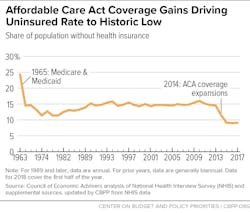Healthcare Costs Are Killing US Manufacturing
The U.S. manufacturing industry is at its lowest level in modern history, now at 11% of GDP. The cause is the growth of the healthcare Industry and how the U.S. pays for it. A simple comparison of the percentage change in GDP of the healthcare industry versus the manufacturing industry shows a direct correlation between the growth of one and the shrinkage of the other, percentage point for a percentage point. No other industry besides manufacturing has seen such a decline during this time period.
The cause is simple: the U.S. is the only industrial country where the employer directly pays a substantial share of employees' healthcare benefits. In other nations, for the most part, citizens themselves and businesses foot the bill, through income taxes.
The most fundamental rule of competition is to lower manufacturing costs, whether it is for a small business or a whole country. Until the United States goes from an employer-paid system for healthcare benefits to a citizen-paid policy, it will continue to lose its dominance in manufacturing.
U.S. payment of healthcare costs by employers causes the loss of U.S. manufacturing companies and manufacturing jobs. Health care costs, both primary and secondary, are passed during each step to the next contributor in the manufacturing process; think of it as value-added tax, moving the health care benefit costs to the next purchaser of services or goods. But each time the cost is passed on to another manufacturer in the supply chain, there is an additional markup for profit; therefore, manufacturing employers’ portion of the $3.6 trillion spent annually on healthcare in the United States is included in manufacturing costs. No other industry has as many links in the supply chain for cost markups or have international competition.
A manufactured good is made through several steps to get to finished product, with each step adding the subsequent employee healthcare benefits cost to the finished product. These costs are referred to as the indirect healthcare costs. For instance, Step One, in the manufacture of a car, the miners of the ore have healthcare costs, which are marked up and passed along in the cost of the ore, Then, Step Two, the ore is purified and shaped in the steel mills, which adds more healthcare costs, that are passed on. Then, Step Three, all the various components are assembled by the auto mobile manufacturers, adding more healthcare costs, then finally, Step Four, the retail auto salesforce sells the cars and adds their healthcare costs. Each individual group must sell its products above its break-even point of costs to stay in business and then add another layer of costs to cover profits and taxes.
By eliminating the direct and indirect employer’s healthcare costs, the final finished good’s break-even point is much lower and can be competitively priced. International manufacturing competitors do not have these additional layers of healthcare costs. For the United States to compete we must eliminate employer paid health care insurance.
However, eliminating the Affordable Care Act is not part of the solution. It will only increase the cost of health care in the country and overwhelm Medicaid programs; an additional 20 million individuals will be put back on Medicaid. The number of personal bankruptcies caused by medical claims will revert from today's half a million, back to 1.5 million.
The solution is to go further than the Affordable Care Act and cover every man, woman, and child, and pay for the coverage with income tax revenues.
I am a liberal Republican who wants to grow and strengthen our manufacturing industry. Many socialist systems are reasonable, such as the Army, Navy, Airforce, FBI, police and fire departments, Medicare/Medicaid, Social Security, unemployment benefits, etc.
Creating a health care system for everyone, thereby improving the health of the labor force, paying for it through income taxes, and lowering the nation's cost to one-third, makes economic sense to me. Our economic system must support our manufacturing industry if we are to survive.
In the final analysis, a single-payer health care system will strengthen our capitalistic free-enterprise system. Manufacturers will bring their plants back or open new plants when it is economically sound to produce goods made in the United States.
Roy Meidinger is author of the book The Truth about the Healthcare Industry. He is retired from AT&T and lives in Fort Myers, Florida.


